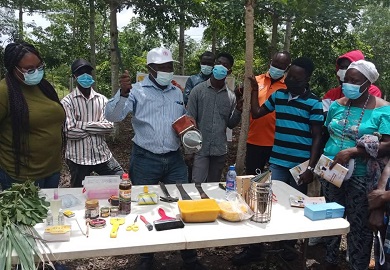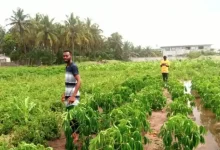
The Deputy Director-General of the Council for Scientific and Industrial Research (CSIR), Professor Paul Bosu, has expressed worry about how bees have come under serious threat in Ghana.
These threats, according to him, had compelled his outfit with donor support from the Canadian government under the Modernised Agriculture in Ghana project to create awareness on the critical role bees play in human life, and draw public attention to the various roles of bees in the life of mankind.
He, however, charged the public to use more sustainable ways of harvesting bees to avoid bushfires.
Prof. Bosu was speaking at a day’s training last Friday in Winneba on bee- keeping aimed at equipping selected individuals with basic bee-keeping technologies as a sustainable source for income generation.
The participants drawn from Tema, Effutu , Agona Swedru and Cape Coast, included staff of the National Youth Authority, farmers, Agriculture Extension Officers from the Ministry of Agriculture and the media.
Topics discussed were bee-keeping, bee-biology and behaviour, bee-keeping equipment, the apiary, harvesting processing of honey and wax, bee diseases and pests.
Prof. Bosu said bees were critical to human existence due to the role they played in the environment, especially food production, ecosystem function and biodiversity conservation.
For him aside the afore mentioned, honey was also an important raw material in the production of cough medicine, wax and hair products.
“Not only do bees produce honey but their pollination of crops is vital”, he said and added that “one in every three mouthfuls of food we eat directly or indirectly depends on pollination by bees.”
“For fruits and nut crops, pollination dictates the maximum number of fruits and is therefore key to increasing yield,” he stated.
He said the demand for honey was global, that needed investment from the private sector, individual, government and Non-Governmental Organisations to reap the benefits.
Prof.Bosu said while the importance of investment could not be underestimated, inefficient skill development, knowledge sharing and technological development were hindering growth in the sector.
For her part, Madam Naomi Appiah, Head of Commercialisation Division Forestry Research Institute of Ghana, said although her outfit encouraged bee-keeping, not all producers meet international export standards.
Food safety and related packaging and labeling, she said, was another key issue.
She, therefore, pledged CSIR’s support to offer technical advice to participants when the need be after training, saying bee-keeping has other positive benefits for local communities such as helping families and youth become self-sufficient
She said the business was very important and lucrative since it needed no major capital.
“It is relatively affordable for local farmers to start up their own business ventures and can start seeing results within three months,” she stated.
She entreated the youth to add value to their skills set to be competitive on the job market.
FROM BENEDICTA GYIMAAH FOLLEY







